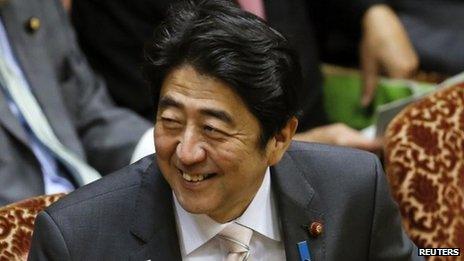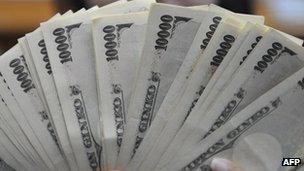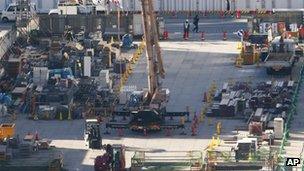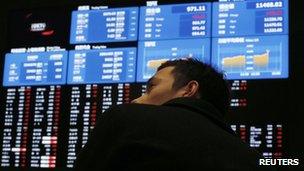Can 'Abenomics' fix Japan's ailing economy?
- Published

Mr Abe has a grand plan to force Japan's economy out of 20 years of deflation
Shinzo Abe makes for an unlikely hero. The Japanese prime minister's office recently published a video of him speaking in English that had some Japanese friends of mine, without exception, either cringing with embarrassment or falling about laughing.
But Mr Abe is not to be underestimated. The Nobel Prize-winning economist, Paul Krugman, for one has been singing the praises of Japan's new prime minister.
The reason? A group of economic policies that have already become known here as "Abenomics".
Abenomics is Mr Abe's grand plan to force Japan's economy out of deflation and serial recession. To do so, Mr Abe has two main proposals.
The first is to print lots of money. Monetarist economic theory states that varying the amount of money in circulation in an economy can control the rate of inflation.

Part of Abenomics is for the central bank to print more money
Decreasing money supply brings inflation down. Increasing it pushes inflation up.
Japan has been stuck in deflation for much of the last 20 years. Prices and wages have been falling. Strange as it may seem, falling prices are actually bad.
Companies and people do not want to invest in things that will be worth less tomorrow. To keep your economy moving nicely, you need a certain amount of inflation.
So Mr Abe has decided that the Bank of Japan must keep printing more and more money until the inflation rate picks up to 2%.
Trader Fumiaki Sagara: "Mr Abe has brought back confidence''
Increased spending
The second proposal is to spend lots of money. Classic Keynesian economic theory states that economies can get stuck in recession when companies stop investing and people stop spending.
In that situation, the government needs to step in to make up for the shortfall. Government spending gets the economy moving again, increases confidence, and gets private companies to start spending again too.
As soon as he came to power, Mr Abe went on the offensive.
In just three months, from January to April, he said that his government would spend an extra $114bn (£75.04bn).
Schools and roads would be fixed and flood and earthquake defences reinforced, he said. There would be new money for scientific research and renewable energy.

Mr Abe said money will be spent on infrastructure
It all sounds wonderful, but will it work?
In some ways, it already has. Since Mr Abe's election, Japan's stock market has taken off, rising by 30% in the last three months.
Game talk
Inside a nondescript apartment building on a Tokyo waterfront, Fumiaki Sagara spends his days sitting in front of a bank of eight computer screens trading stocks.
In the last six weeks, he has made in the region of $300,000, thanks to Mr Abe.
"For us it's all about the flow of money," he said.
"Mr Abe has brought back confidence, and that means money is flowing back in to the markets. When that happens the market goes up and we make money."
The second consequence of Mr Abe's policies is a dramatic fall in the value of the Japanese yen. That is very good for Japan's exporters. Their products are cheaper, their overseas profits worth more.
But all Mr Abe has really done so far is talk a good game. The next part will be a lot harder.
Japanese governments have a notoriously poor record at spending on infrastructure.
Japan is dotted with engineering wonders - the world's longest suspension bridge ($5bn), the world's longest undersea rail tunnel ($3.6bn) and the world's largest underground flood control system ($2bn).

Japan's stock market has risen by 30% in the last three months
In the 1990s, Japanese governments spent over a trillion dollars trying to build their way out of trouble. It did not work.
Debt problem
Martin Shulz, senior economist at the Fujitsu Institute in Tokyo, says this time may be different.
"We're not talking about building the bridges to nowhere anymore" he said.
"That era is over. We need smart infrastructure to link Japan to the global market and Asia, if the government spends money on that sort of infrastructure it can be very worthwhile."
But others are not so sure. Takeshi Fujimaki is an economist and hedge fund manager. He says Abenomics will not work because Japan already has so much debt.
Japanese government debt is already the biggest in the developed world, around 230% of the gross domestic product (GDP).
"Japan's government debt is more than $13 trillion," said Mr Fujimaki.
"But its annual revenue is only about half a trillion dollars. If interest rates go up to just 1%," he said, "the Japanese government will have to spend a quarter of its annual income just on servicing its debt".
"If Abenomics works, it will accelerate the bankruptcy of Japan," he added.
- Published20 February 2013
- Published21 February 2013
- Published15 February 2013
- Published14 February 2013
- Published17 December 2012